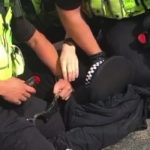The West Yorkshire Police 6
Minneapolis and UK Policing #6
by TIM HICKS
~~~~~
Introduction
The NYE has been running a series of articles on the impact of the death of Mr George Floyd in Minneapolis on policing in the UK.
- Minneapolis and North Yorkshire #1 covers the impact of the death of Mr George Floyd in Minneapolis on policing in North Yorkshire.
- Minneapolis and North Yorkshire #2 Covers UK national and North Yorkshire Police policy on chokeholds.
- Minneapolis and North Yorkshire #3 and Public filming York Incident (which contains a correction to article 3) cover public filming of the police, particularly when filming alleged police misconduct and the incident in York referred to above.
- Minneapolis and UK Policing #4 – NYE Vindicated which posed the question how often are chokeholds being used by the UK Police.
Use of chokeholds/neck restraints
The College of Policing was established in 2012 as a professional body for everyone who works for the police service in England and Wales. According to its website:
“The purpose of the College is to provide those working in policing with the skills and knowledge necessary to prevent crime, protect the public, and secure public trust.
We have three complementary functions:
-
- Knowledge – we develop the research and infrastructure for improving evidence of ‘what works’. Over time, this will ensure that policing practice and standards are based on knowledge, rather than custom and convention.
-
- Education – we support the development of individuals in policing. We set educational requirements to assure the public of the quality and consistency of policing skills and we facilitate the academic accreditation and recognition of policing expertise.
- Education – we support the development of individuals in policing. We set educational requirements to assure the public of the quality and consistency of policing skills and we facilitate the academic accreditation and recognition of policing expertise.
-
- Standards – we draw on the best available evidence of ‘what works’ to set standards in policing for forces and individuals. Examples include our Authorised Professional Practice (APP) and peer reviews.
- Standards – we draw on the best available evidence of ‘what works’ to set standards in policing for forces and individuals. Examples include our Authorised Professional Practice (APP) and peer reviews.
We will have a mandate to set standards in professional development, including codes of practice and regulations, to ensure consistency across the 43 forces in England and Wales. We also have a remit to set standards for the police service on training, development, skills and qualifications, and we will provide maximum support to help the service implement these standards.”
[My highlighting in bold]
The College of Policing policy is below:
“Regarding your query about choke holds, the national personal safety training for officers in England and Wales does not contain any choke holds or restraint technique where officers apply pressure to the throat or neck area of a person. Officers are actively discouraged from this, due to the inherent dangers of putting pressure on the neck or throat, particularly during restraint.”
If officers believe that they or other members of the public are in imminent danger, they are permitted to use any reasonable and necessary force to prevent that danger. In such circumstances officers could use their professional judgement to deem it reasonable, proportionate and necessary to use a restraint technique which could potentially cause serious injury.
[Source: College of Policing]
The guidance is clear that chokeholds should be avoided, but individual officers are able to use whatever level of force they feel is necessary to manage violence or threat that is presented to them or another person. This is because guidance cannot cover all eventualities. A police officer may have to do something that is not contained in the guidance, or do something that the guidance advices them is dangerous/runs a high risk of injury in order to protect themselves or others. A hypothetical example is if an unarmed officer drives a car at a person who is about to shoot someone.
However, all police officers and staff have to use the College of Policing National Decision Model to help make the best decision and to explain their actions afterwards. They must expect to be asked to account for the force that is used and to explain why they thought it was necessary and proportionate to the threat they faced.
Sussex Police issue a clarification and the NYE issues a correction
The fifth article in the series Minneapolis and UK Policing #5: More chokeholds covered the differing response to use of neck restraints by the IOPC to three incidents in Sussex, London and Leeds. It has proven to be controversial.
In this article I stated:
“Arrest in Brighton by officers of Sussex Police in which it is alleged a neck restraint was used.
This video surfaced of a man being arrested in Brighton by officers of Sussex Police on the 7th of July: Video here which allegedly shows three officers acting in joint enterprise restraining a man, with one officer apparently applying restraint to a man’s neck. Excellent article from the Brighton and Hove News containing a full statement by Sussex Police can be read here.
Contrary to what was first thought, the IOPC investigation in Brighton is unrelated to the use of a neck restraint on the man on the ground. The IPCC investigation focuses on a use of force prior to the video being taken and not on the restraint of the man on the ground. Indicating that the officer’s conduct in applying it was acceptable. In the Leeds and London incidents, police officers are under investigation for applying a neck restraint, indicating that it isn’t.”

https://www.brightonandhovenews.org/wp-content/uploads/2020/07/Montpelier-Road-arrest.jpg
Police officers restraining a man in Brighton
Following a request for clarification on the apparent contradiction between the way the Metropolitan Officers and the Sussex Officers were treated, Sussex Police issued this statement clarifying the situation:
“After body worn video footage in relation to the whole interaction was seen by the IOPC and Sussex Police’s Professional Standards Department (PSD) it was decided that Sussex Police would solely refer the matter relating to an interaction prior to the restraint in the street, which did not form part of the published video.
“A male officer, stationed at Brighton and Hove, is being investigated by the IOPC for misconduct. The officer has not been suspended from duty, but is working on non-public facing duties pending the outcome of the IOPC investigation.
Advice was sought from specialist staff safety trainers in relation to the restraint and the technique used, which is approved by the Home Office, and this was considered appropriate and proportionate.”
A spokesperson for Sussex Police also confirmed to the NYE that neck restrains are not authorised in Sussex Police force policy.
The initial line I took on the Montpelier Road incident was to connect it to the controversy over use of neck restraints and choke holds. It now transpires that the restraint used was not a chokehold or neck restraint and was therefore within the College of Policing Guidance. So the line I took in the article was wrong.
I am happy to publish the above statement from Sussex Police clarifying the situation and to issue a correction.
This nevertheless does not change the overall concern expressed in the article, which is that it appears the law is not being applied consistently to officers from different forces.
Incidents involving alleged use of chokeholds/neck restraints
There have been incidents allegedly involving the use of use of neck restraints/chokeholds by police officers in London (Metropolitan Police), Leeds and Halifax (both West Yorkshire Police).
Video of the London incident which contains graphic images that some readers may find disturbing can be seen here. Video of the Elland Road incident which also contains graphic images can be seen here.
In the incident in Halifax (see lead illustration) this BBC Report states that a chokehold was applied and includes an interview with Mr Hassan Ahmed, the man who was arrested referred to above, in which he states he thought he was going to die. The officer was filmed stating “chill out or I’ll choke you out” and then, “Chill out or you’re going to sleep.” Another officer then assisted him to arrest the man, but did nothing to restrain the Constable allegedly applying the chokehold.
Video footage of the incident can be seen in this ITV Report, along with an interview with the man that recorded it.
West Yorkshire Police issued this press statement to the NYE:
Temporary Assistant Chief Constable Osman Khan of West Yorkshire Police said:
“We are aware of a video circulating showing the arrest of a man at Spring Hall Gardens, Halifax on Sunday 16 August in relation to assault offences.
We immediately reviewed the footage and looked into it as a matter of urgency to establish the full circumstances.
We have reviewed the actions of the officers involved and a referral has been made to the Force’s Professional Standards Directorate.
“Our investigation remains ongoing and we have made a voluntarily referral to the Independent Office of Police Conduct (IOPC). The officer involved has been suspended from the force.
“The man arrested was released under investigation.”
The Independent Office for Police Conduct (IOPC) issued this statement to the NYE:
“The Independent Office for Police Conduct (IOPC) is to investigate the actions of West Yorkshire Police officers following the arrest of a man in Halifax on 16 August.
Video footage showing part of the arrest in Spring Hall Lane was shared widely on social media and shows the man being restrained on the ground by officers.
After receiving a voluntary referral from the force, the IOPC is now independently investigating the incident.
We would like to speak to anyone who may have seen or heard this incident which took place at around 3pm on Sunday.
Witnesses can email SpringHallLane@policeconduct.gov.uk or ring 0300 303 5730
IOPC Regional Director Miranda Biddle said:
“We can understand why the images circulated have caused considerable public concern and we would like to reassure members of the community that we have taken the decision to independently investigate this incident after West Yorkshire Police made a voluntary referral to us.
An investigation has now commenced to ensure that we are able to fully understand what happened. It is vital that we are able to impartially determine the facts.
We have already begun to gather evidence but we would like to speak to anyone who was in Spring Hall Lane in Halifax at around 3pm on Sunday who may have witnessed this incident.”
I do not know what happened before the video clip, or the full circumstances of the arrest, so I will not comment. It is now down to the officer concerned to justify his actions.
In my opinion, this incident raises various issues:
- Was a chokehold applied?
- If in fact a chokehold was applied, a) why did the second officer not order his colleague to immediately release him from it, and b) why has the second officer not been the subject of investigation, for failing to challenge improper conduct?
- Even if a chokehold was not applied. Is it acceptable for a police officer to obtain compliance by threatening a man he is arresting with use of a chokehold, which is a prohibited technique that could endanger his life?
- Has this officer applied chokeholds when making arrests before? He certainly appeared confident and earnest in his threats.
- Irrespective of the two threats to use a chokehold quoted above, was the use of force in this arrest appropriate or excessive?
- Did the second officer report his colleagues conduct?
- West Yorkshire Police has now had two incidents of alleged use or threatened use of a neck restraint in the past five weeks. Is this a widespread practice in West Yorkshire Police, given that in both cases other officers stood by and failed to intervene?
Elland Road and Minneapolis compared
I would further comment that there are some striking similarities between the Minneapolis incident and the Elland Road incident. In both cases, the officers fall into three groups:
- The one officer that applied the neck restraint.
- The two officers who acting in joint enterprise, assisted the officer to applying the neck restraint by holding the arrested person down.
- The one officer in Minneapolis and at least three at Elland Road who were not involved in restraining the arrested man, who observed a neck restraint being applied but did not restrain or report their colleagues.
In the Minneapolis incident, all four police officers were eventually charged, even though application of a neck restraint was authorised by Minneapolis Police Department force policy and the two police officers that assisted in applying a neck restraint were probationers in their first few days of policing after leaving the police training academy.
Inconsistent treatment of Yorkshire Police Officers that fail to challenge and report misconduct
Under the College of Policing Code of Ethics, if a Constable that sees a police officer committing an act of misconduct, he has a duty to intervene and restrain him. He also has a duty to report that officer’s misconduct.
“10.1 According to this standard you must never ignore unethical or unprofessional behaviour by a policing colleague, irrespective of the person’s rank, grade or role.
10.2 You have a positive obligation to question the conduct of colleagues that you believe falls below the expected standards and, if necessary, challenge, report or take action against such conduct.”
This must be particularly true if the alleged misconduct -applying a chokehold or a neck restraint- may be life threatening.
In none of these cases did any of the seven other police officers present (one in London, one in Halifax at least five at Elland Road) report any concern at all over the conduct of the officer applying the restraint. Extraordinarily, the IOPC investigation was only triggered because the police were filmed by a member of the public and the video was uploaded onto social media.
I freely admit that I am not a lawyer, I was not present and I do not know what happened before the video was taken. But it seems to me that if there is sufficient evidence to justify an investigation into an officer for applying a chokehold or neck restraint, then prima facie there must be enough to warrant an investigation of the other officers that acted in joint enterprise with him by holding the arrested person down while the chokehold or neck restraint was applied. It follows from this that the other officers that failed to intervene or report it as a potential act of misconduct should also face investigation as the Metropolitan Police Officer has done. There are at least ten officers involved in the London, Halifax and Elland Road incidents. In summary:
- All three officers alleged to have applied a chokehold or neck restraint are the subject of an investigation. Which is consistent with the College of Policing guidance and across both forces.
- One Metropolitan Police Officer and three West Yorkshire Police officers held an arrested person down while a chokehold or neck restraint was allegedly applied. Yet only the Metropolitan Officer is the subject of misconduct proceedings for contravening the Code of Ethics by not “challenging and reporting improper conduct” and failing to meet its requirements on “authority, respect and courtesy and honesty and integrity”. This is clearly inconsistent.
- One Metropolitan Police Constable and the six West Yorkshire Police Constables were present at the three incidents, but did not restrain their colleague or report his misconduct. Only the Metropolitan Officer is the subject of misconduct proceedings. Again this is inconsistent.
The IOPC can direct forces to record incidents and then ‘call them in’ to be investigated by the IOPC. It can also consider incidents that have not been referred to it by police forces and decide whether and how it will investigate them. The IOPC sets the Terms of Reference of all its investigations. They are shared with the force and the IOPC decision maker can then decide whether to amend them in response to feedback. Should anything happen during the course of the investigation, the Terms of Reference can be amended.
So it is clear that the IOPC has power to investigate the six West Yorkshire Constables that allegedly did not challenge or report potential misconduct, not just the two that allegedly applied a chokehold or neck restraint. Yet it is not doing so.
The IOPC, the West Yorkshire Police Six (WYP6) and a culture of impunity
Notwithstanding the publicity over the death of Mr Floyd and President Trump banning use of chokeholds across the USA, it appears that some Police Officers may be defying the College of Policing standard to apply chokeholds/neck restraints without adequate justification, failing to intervene when they are allegedly applied and failing to report potential acts of misconduct. This is concerning:
- It must be clear to police officers from their training, that use of chokeholds is discouraged by the College of Policing guidance and force policy. It follows from this that use of a chokehold or neck restraint is going to be very, very difficult to justify. Particularly if the entire incident is captured on video.
- Police Officers must also know that with the proliferation of CCTV and mobile ‘phones, police officers will be routinely filmed, particularly if they are making arrests, or are suspected of misconduct. The Halifax incident was filmed covertly from inside a house, so the officer was not even aware he was being filmed.
- Such is the credibility of video evidence, that video uploaded onto social media ten minutes later can create a storm of controversy overnight and simultaneously be used as the basis of misconduct proceedings or a criminal prosecution.
I can only conclude that this continuing use of chokeholds is tacitly approved and that police officers will routinely ignore the Code of Ethics, to back up their colleagues no matter what.
In my view this is because:
- The police have not been subject to adequate supervision. Even very serious infringements of discipline and serious crime have gone unpunished by Chief Constables, the IOPC and its predecessor organisation the Independent Police Complaints Commission (IPCC).
- Police misconduct regulations and the Code of Ethics have been applied inconsistently across all forces by Chief Constables, the IOPC and the IPCC.
I believe this has led to a culture of impunity in some police forces:
“The impossibility, de jure or de facto, of bringing the perpetrators of violations to account – whether in criminal, civil, administrative or disciplinary proceedings – since they are not subject to any inquiry that might lead to their being accused, arrested, tried and, if found guilty, sentenced to appropriate penalties, and to making reparations to their victims.”
“Impunity arises from a failure by States to meet their obligations to investigate violations; to take appropriate measures in respect of the perpetrators, particularly in the area of justice, by ensuring that those suspected of criminal responsibility are prosecuted, tried and duly punished; to provide victims with effective remedies and to ensure that they receive reparation for the injuries suffered; to ensure the inalienable right to know the truth about violations; and to take other necessary steps to prevent a recurrence of violations.”
[Source: United Nations Commission on Human Rights Set of Principles for the Protection and Promotion of Human Rights Through Action to Combat Impunity].
The IOPC: Upholding lower standards of police conduct in Yorkshire
The IOPC was provided with a draft of this article and asked for a comment, but declined to do so. In response to a previous request for comment on the inconsistent approach taken to the Metropolitan Police compared to the West Yorkshire Police, an IOPC Spokesperson confirmed:
“Every investigation has its own unique set of facts and our decisions are made on the evidence available to us at the time – the majority of which is not in the public domain.”
This is true and I would again emphasise that I have not had access to all of the evidence that the IOPC has considered. Nevertheless in my opinion this comment does not address the issue of why a Constable from the Metropolitan Police is now facing the possibility of proceedings, while the WYP6 who appear to have committed the same offences are not.
This contradictory response by the IOPC is concerning. The College of Policing was established to uphold national standards published in the Code of Ethics. The public expect the police to meet that standard and that the IOPC will hold all police officers to it. The people of Yorkshire have the right to expect the same standard of policing as Londoners.
Currently there appears to be one standard on challenging and reporting unethical or unprofessional conduct by police officers in London and a lower standard in Yorkshire. It is essential that the IOPC upholds this principle across all forces, not just the Met. The current situation and the failure of the IOPC to comment openly on it undermines public confidence in the police service and the IOPC.
Further, the refusal by the IOPC to engage and meaningfully respond to this concern is contrary to its commitment promulgated on its website, to have a “clear and transparent process to handle any …. feedback you have about our service”. The public also expects the IOPC to be open and accountable.
It is the duty of journalists to hold the police and the IOPC to account and to challenge this.
We know that the NYE is widely read by police officers. I hope that these NYE articles will lead to greater awareness of the dangers involved in applying chokeholds/neck restraints and help deter them from using them.
To this end, the NYE will continue to follow this issue, to improve standards of policing and confront the culture of impunity that appears to exist in some police forces and public bodies.
Right of Reply
If you are mentioned in this article and/or do not agree with the views expressed in it, or if you wish to correct any factual inaccuracy. Please let me know using the letters@nyenquirer.uk email address. Your views and a correction will be published if appropriate.




![Minneapolis and North Yorkshire [REDUX]](http://nyenquirer.uk/wp-content/uploads/2020/07/ARREST-150x150.jpg)
![“On the Trail of the Yorkshire Ripper” [Book Review]](http://nyenquirer.uk/wp-content/uploads/2020/06/RIPPER_TRAIL-150x150.jpg)





















Comments are closed.